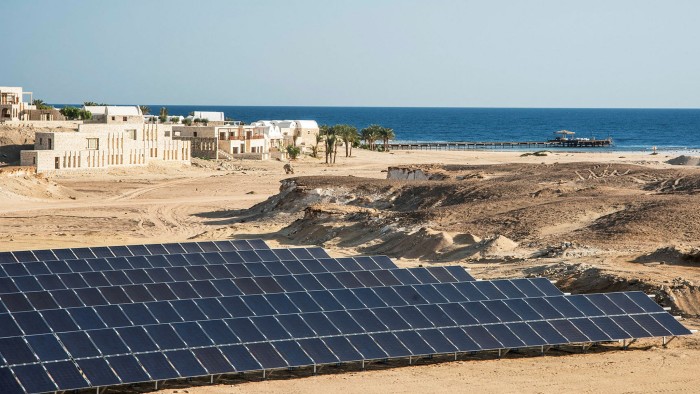Solar power shines through after a slow start in Africa

Simply sign up to the Renewable energy myFT Digest -- delivered directly to your inbox.
Africa is sometimes called the sun continent, warmed by more hours of bright sunshine than anywhere else on earth. Yet, the penetration of solar power, despite its obvious potential, is low: the World Bank estimates that Africa’s installed solar energy capacity is half that of the UK.
Spotting an opportunity, entrepreneurs have braved regulatory hurdles, high import tariffs and an untried clientele to establish solar companies on the continent that can profitably provide renewable power.
And, for some, it is paying off. Two of the top 20 businesses in the FT and data provider Statista’s 2022 ranking of Africa’s Fastest Growing Companies are solar energy providers. “It’s a booming market,” says Hugo Le Picard, a research fellow at the Centre for Energy & Climate at the French Institute of International Relations (IFRI). “With a fast-growing and urbanising population, decentralised solar systems are becoming the go-to choice for power generation.”
The draw of solar is its cost and flexibility. Compared with other renewables, solar panels are relatively cheap and can be installed just about anywhere. This has prompted the private sector to invest heavily in solar rather than hydroelectric, geothermal and wind power, which have geographical limitations and cost more.
One of the first solar companies to launch in Egypt was KarmSolar, 19th in the FT ranking. Sitting in a café in Cairo in 2011, its founders Xavier Auclair, Randa Fahmy, Yumna Madi and Ahmed Zahran came up with an idea to help farmers in the Bahariya Oasis — unconnected to the central grid — to power water pumps using solar energy instead of diesel generators. The company signed a contract with agricultural developer Fridal and constructed 33 wells for its farmland.
“In the beginning, trust was very low for solar, not a lot of clients could wrap their head around it,” says Sami Awa, e-mobility manager at KarmSolar. “We were one of the first players in Egypt [so] there was a lot of additional work we had to do around education.”
By 2015, the company saw that there were opportunities in solar beyond water pumps. They began targeting off-grid regions using a power purchase agreement (PPA) model, under which clients would pay back the infrastructure costs over a 30-year period as part of their electricity tariff. Its first such contract was with Juhayna, a large dairy business, for a 1MW station serving an 11,000-acre off-grid farm.
That same year, KarmSolar became the first Egyptian company to gain an independent power producer licence from its energy authority, allowing it to sell electricity from a large off-grid solar facility.
Since 2019, the company’s largest shareholder has been French multinational EDF Renewables and its activities have expanded to include water desalination, construction management and architecture.
Later arrivals have benefited from the falling costs of solar technology in recent years. Among them is GridX Africa, which was launched in 2016 and provides off-grid solar power to safari lodges, property developments, and farms across Kenya, Mozambique and Tanzania.
More from this report
Co-founder Chalker Kansteiner says that ample scope for innovation makes operating on the continent exciting. Many African countries do not have fully established, centralised grid networks, he notes, so utilities and power infrastructure developers do not face a firmly entrenched status quo when introducing renewables.
“A big trend in power generation today, which can mitigate climate change impacts and improve energy security, is moving towards a more distributed energy system, where the private sector has a place,” he adds.
For example, in January, Kenya suffered a nationwide power blackout after pylons collapsed, affecting businesses, hospitals, services and other users for 24 hours. Distributed solar networks not attached to the grid were able to continue operating.
“That is the promise of solar and battery technology,” Kansteiner says.
In west Africa, too, solar is making inroads. Sixth on the FT/Statista ranking is Nigeria-based Starsight Energy, whose chief executive, Tony Carr, took a bet on renewables after 25 years in mining.
Carr officially launched Starsight in 2017 with an equity investment from Helios Investment Partners and Africa Infrastructure Investment Managers. That followed an 18-month proof-of-concept period in which the company targeted banks, persuading them to switch to solar from the diesel generators that are ubiquitous in Nigeria.
Starsight estimates that its sites receive on average 12 per cent of their power from the central grid, with the remainder generated from other sources. Its focus is not simply providing electricity; it also aims to make organisations energy efficient, by assessing buildings and replacing lighting and air conditioning equipment with more efficient models, for a typical energy saving of about 20 per cent.
“When we started, nobody thought renewables could deliver a bank’s energy needs,” says Carr. “In 2017, you would never be able to get commercial funding for that kind of business model. Now, we’ve got a queue of bankers around the block wanting to lend us money.”
Comments